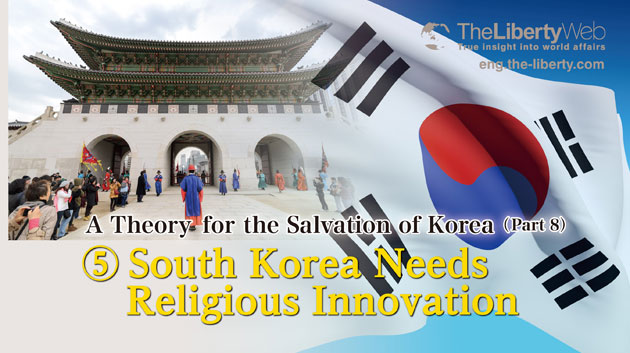A Theory for the Salvation of Korea (Part 8)
⑤South Korea Needs Religious Innovation
Pre-modern thinking
●Persecutes religious beliefs (in particular, Buddhist philosophy)
●Is unable to escape vengefulness
The way to modernization
●Study universal religious thought, and acquire a modern spirit
●Get rid of vengefulness and reexamine world history
Even though Korea has achieved economic growth, it has not changed since the days of Joseon era. Rather than considering what is right or wrong, it seeks power. To be sure, the Korean Peninsula is surrounded by major powers, which must make it very difficult to maneuver politically.
However, that Korea remains unable to modernize, and feels closer to China and North Korea, is not just due to geography. It’s also in its value system.
During the Joseon era, Buddhism was cast out, because the preceding Goryeo dynasty made Buddhism the national religion. Persecution of Christianity was gruesome as well, and in the crackdown of 1866, government forces killed some 8,000 Christians. Similar persecutions occurred repeatedly during the Joseon era. Confucianism lost substance because policy makers who wanted to create a class system. It did not spread ethical values like it had in Japan.
In this way, religion and ethics did not take root in Korea. But actually in Japan and in the West, the spirit of modernization sprouted from religious views.
Religions like Buddhism and Christianity have taught about God, Buddha, heaven, and hell since the ancient times, and people have come to respect righteousness. People have been able to think beyond their limited self-interests because they have approached the subjects of good and evil on religious terms. At the root of the rule of law for Judaism was the Ten Commandments, and for Buddhism, it was the Dharma that preached self-discipline, which tied into the concept of cause and effect. From around the 17th century, social contract theory became popular, which spread ideas on human rights such as freedom of thought and speech. Behind this was the religious ways of thinking that said, “humans are created equally under God and Buddha.”
When Korea threw away Buddhism, which recognized various perspectives and shunned strife, it proved to be an especially big loss. Koreans should have been refining their respect for universal values. According to a Korean professor’s report on research done on social development among the OECD countries, Korea ranked 31st in terms of generosity towards people with special needs, workers, and foreigners.
Koreans have been lacking in generosity, and their culture of revenge, that’s still in place today, must be somehow be at fault.
Faith Shall Open the Door to Independence
For Korea to modernize, it must learn something about the righteousness of God or Buddha through universal religious thought, and reflect on its history.
President Park Chung-hee produced the “Miracle of the Han River” back in the 1960s. Although President Park promoted anti-Japanese sentiment within his education system, he pressed for Korean independence in his work, “The Nation, The People, and Me.” He wrote, “Looking at the history of our own people, I can only say how pathetic it is (excerpt). We must reform this history no matter what”.
However, since then, whenever Koreans have misgoverned their affairs, they have come to blame other countries. When frustrations have arisen domestically from such matters as economic recessions; they have released their anxieties with anti-Japanese policies, and built up their hatred for Japan.
Last year in March, President Park Geun-hye stated that, “the flow of history does not change the facts between perpetrator and victim.” However, such ways of thinking are exactly why Koreans have become miserable. Teachings like “you cannot solve hate with hatred in your heart,” are found in Buddhism, and such teachings on forgiveness can release Koreans from their suffering. Fabricating its history would be meaningless by placing blame on others, for their failure to protect their country’s independence.
If Koreans could learn about the righteousness of God or Buddha, and remove the scales from their eyes to reflect back on their history, they would see why Asian countries were grateful to Japan ever since it fought Greater East Asian War. Japan fought to protect Asia from Western colonialism through the generation of wealth for the nations, with military strength, and through the encouragement of new industries. That was the real history from the time period.
In Yukichi Fukuzawa’s “Datsu-A Ron (Escaping from Asia),” which he wrote for the then Japanese government that wanted to modernize the Korean Peninsula, the author recommended that the government would ultimately have to open up the country with force. He foresaw how Russia was spreading south and would eventually colonize the Korean Peninsula.
Today, with the success of the spread of hegemony of China’s one-party dictatorship, Koreans need to modernize themselves more than ever. They must not subservient to China, a materialist nation. The path to prosperity is open for nations that determine to protect the values of freedom, and it’s available through the value systems of those religions that humanity has always relied on.



















